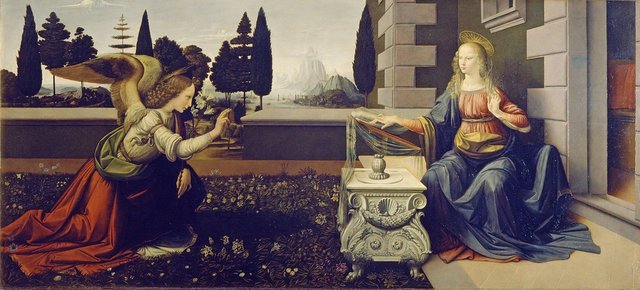The Renaissance Thought // Analysis

The anunciación of the Leonardo da vinci, the Virgen Maria
Already entering more matter, I want that I accompany myself towards the following way, which was a part of our history, in the thought as it it was:
The Renaissance thought.
The renaissance began at the end of the XIVth century in Italy and then it spread over the whole Europe in the XVIth century, this current was characterized for the heyday of a major leading role of the bourgeoisie by mercantilist, who will be acquiring every time major leading role so much in the change in the social standards and politician of this moment in the history. His ascent would see facilitated by the crisis of the papacy and of the imperial idea, the governing poles in the medieval Europe.
he informed Them that in the middle of the XVth century, a movement existed in the church reformist, who tried without success to impose the supremacy of the councils on the papal authority. Later, when the dads turned into the big Renaissance patrons, Lutero and Calvino headed the schism that caused the Protestant reform, since if we it see in the following position renaissance, there was a movement of cultural and scientific renewal, marked by the recovery of the classic culture a grecorromana and the emulation to overcome the limits imposed by the authority imposed by the dogmatic and inflexible authority of the church, the discovery geographical, the opening of new commercial routes and especially, the invention of the printing in 1436, which facilitated the circulation of new ideas. In this one climates of cultural fervor. The humanism impelled the study of the sciences, the skill, the literature, the philosophy and the art as a base of the record of the antiquity, placing the human being in the center of his worries.
Next I want to share the following information across the following textual appointment, way of informative papers.
<br
My exhibition has tried to reflect this transit and changes, and inside the options, which were fitting, has showed and described what seems to be beating in all of them: concord in the existence and better republic, as Utopian sleep or as deep wish of the being in the time of the history.
there Has been the history of this trip, of this divine piece of news a comedy or affectionate human exploit, that in three day across the Renaissance and the Baroque, he has claimed what to the task it is up to thinking, perhaps, him in the time of the history, to the watchtower Biblical in the tower of the citadel, to be able to discern as by means of the signs and indications that are looked down in the horizon, which it is necessary to determine like possibly before the urgency of the urgent thing that approaches, and that is always the present.
you have showed Us, also, what sublies below the systems and the concrete arrangements that are constructed in the time of the history. Beyond what they are considered to be system or orders of saberes and of solidly founded methods, beyond the emulation or contrast of same, as it has been seen in the philosophy of the Renaissance and of the Baroque, what sublies is the question for the existence and his senses, or better, it is the proper existence the one that is interrogated on the sense of yes same and of all the created and found, and the diverse options that are arising in that one does to himself the existence in the search of the truth.
textual Appointment of the book, The speech of the saberes in the Europe of the Renaissance and of the Baroque for José Luis Fuertes Herreros – 2012; pages 265 - 266.
There Arises the need of the following unknown, what one will be the contribution of the renaissance to the thought, I say to them the following thing, since the philosophy although at present, in this moment to see the things we her value very little, this science is the first one that has encouraged the advance and the progresses of the human being, in which that they are served as support in almost all other scientific, political and social disciplines across the question, to enrich the knowledge, in such a way that the epoch of the renaissance is born this the same need to see the things and to be a protagonist in this moment of the thought, even the point immortalized for way the art and as influential culture in the way of thinking and of organizing the social stratum, giving piece of news it designs in the Renaissance politics on the social class, up to the humanist point of value the proper being.
Bibliographical source.
The Renaissance Thought and his sources for Paul Oskar Kristeller - 1993.
The Modern Thought: Philosophy of the Renaissance for Luis Villoro - 2010.
The speech of the saberes in the Europe of the Renaissance and of the Baroque for José Luis Fuertes Herreros - 2012.
